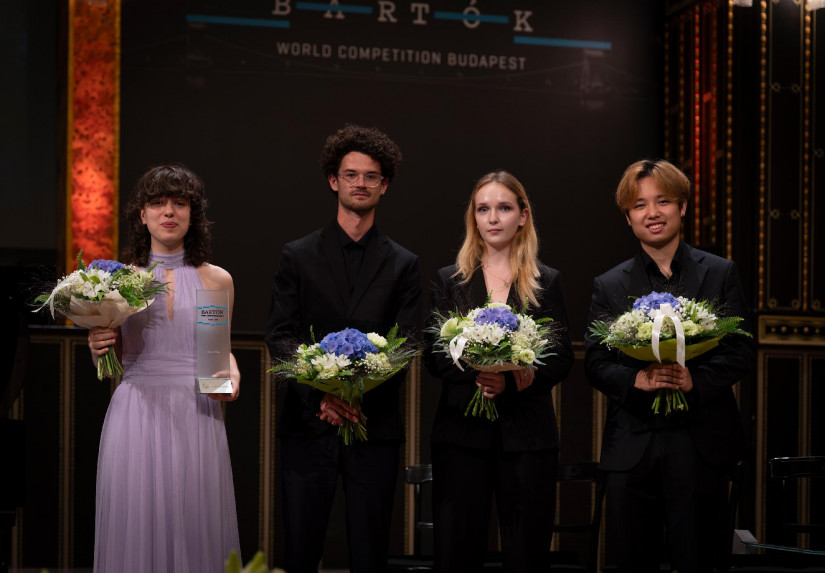Korean-German pianist wins Bartók World Competition 2025
Jeonghwan Kim was awarded with the first prize of €22,000 after Sunday's orchestral final at this year’s Bartók World Competition organised for pianists at the Liszt Academy in Budapest.
Second place was shared by Ildikó Rozsonits from Hungary and Gorka Plada from Spain, each earning €8,000 while third place, worth €8,000, went to Russian pianist Anastasiia Kliuchereva, based on the decision of the prestigious international jury. The panel also awarded special prizes: Jeonghwan Kim won the €4,000 prize for the best Bartók interpretation and the €2,000 prize for the best performance of contemporary works from last year's composer round, which were included in the competition repertoire. The audience prize of €1,500 was awarded to Ildikó Rozsonits by those attending the final.
Thanks to donations from the competition's partners, a number of additional special prizes were also awarded. Jeonghwan Kim received concert invitations from the Liszt Academy, the Szeged and Miskolc Symphony Orchestras, and the Hungarian Radio Arts Ensembles. Ildikó Rozsonits received the Papageno media package and concert invitations from Müpa, the National Philharmonic Orchestra and Filharmonia Hungary, while Anastasiia Kliuchereva received an invitation from the Savaria Symphony Orchestra. Sebestyén Pellet, who reached the solo final, received the Fidelio Fortissimo prize, which includes media coverage, as well as concert invitations from the Bartók Memorial House and the MÁV Orchestra.
 Ildikó Rozsonits, Gorka Plada, Anastasiia Kliuchereva, Jeonghwan Kim (photo: Posztós János)
Ildikó Rozsonits, Gorka Plada, Anastasiia Kliuchereva, Jeonghwan Kim (photo: Posztós János)
In the orchestral final held on Sunday in the Grand Hall of the Liszt Academy, Anastasiia Kliuchereva played Bartók's Piano Concerto No. 3, Gorka Plada and Jeonghwan Kim played the No. 2, meanwhile Ildikó Rozsonits choose Beethoven's Piano Concerto No. 5 (in E-flat major). They played with the Hungarian Radio Symphony Orchestra conducted by Gergely Dubóczky, after the originally invited conductor János Kovács was forced to withdraw due to illness.
At the award ceremony, pianist Dr. Gábor Farkas, president and department head of the Liszt Academy, also one of the Hungarian members of the international jury, expressed his gratitude on behalf of the institution to the Hungarian state and the patrons of the competition – President Tamás Sulyok, Balázs Hankó, Minister of Culture and Innovation, and pianist and conductor Tamás Vásáry – for supporting the event, as well as the jury, led by Yoheved Kaplinsky, the orchestra, the conductor, and the organizing team. He added that, as host, he was delighted that pianists from 19 countries had entered the competition. "There are awardees and there are winners, but I think everyone is a winner, because they have learned a huge repertoire that they can benefit from later," he emphasized. He also spoke about how, with the founding of the Liszt Academy, Ferenc Liszt achieved his goal of raising Hungarian musical culture to new heights: the institution is at the forefront internationally, ranking 12th in the music category of the QS university rankings among the higher education institutions worldwide. "As the legacy of Liszt, Bartók, Kodály, and Dohnányi, Hungarian musical culture is one of the most influential in the world and continues to have an impact to this day," he emphasized. He called it an important part of Hungarian culture that the Liszt Academy can organize such a fantastic and high-quality competition, which also builds the country's image. In his words, as foreign competitors come from far away and are not familiar with the Hungarian language, Bartók's music can bring them closer to it and to what it means to be Hungarian as well as what Hungarian folk music means.
In her speech, Anita Kiss-Hegyi, State Secretary for Cultural Relations, said that this event goes beyond musical excellence, embodying the essence of the creative process and the community-building power of music. She thanked the competitors for choosing Hungarian culture and expressed her hope that, in addition to professional experience, they would also take home wonderful memories from Budapest, Hungary.
Yoheved Kaplinsky, chair of the jury, head of the piano department at The Juilliard School in New York and artistic director of its Pre-College Division, said that it was a great pleasure to work on this wonderful competition, and she thanked not only fellow jury members for their excellent teamwork, but also the staff of the organizing Liszt Academy, who ensured that everything ran smoothly. She also thanked the competitors for contributing to the high standard of the competition with their enthusiasm and sincere performances.
As a supporter of the competition and as part of its long-standing cooperation with the Liszt Academy, the brand owner Yamaha Corporation offered a Bösendorfer 280VC concert grand piano, worth 100 million forints (cca. 250,000 euros), fresh from the Vienna factory, for two years' use. After the solo final of the Bartók World Competition, It will be one of the instruments available in the Great Hall during the coming period, so students will also be able to play it alongside the artists performing here.


